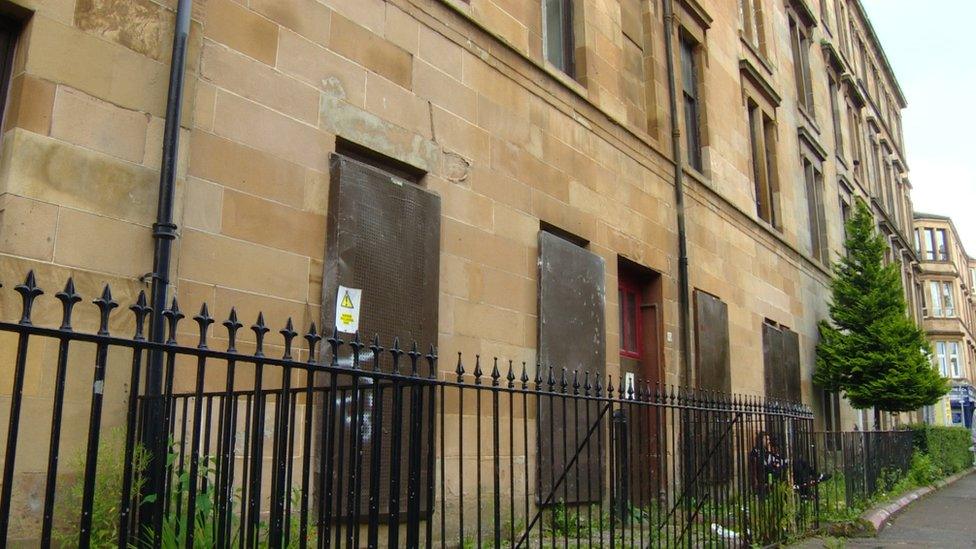A story of Glasgow's Govanhill and its 1960s-style poverty
- Published
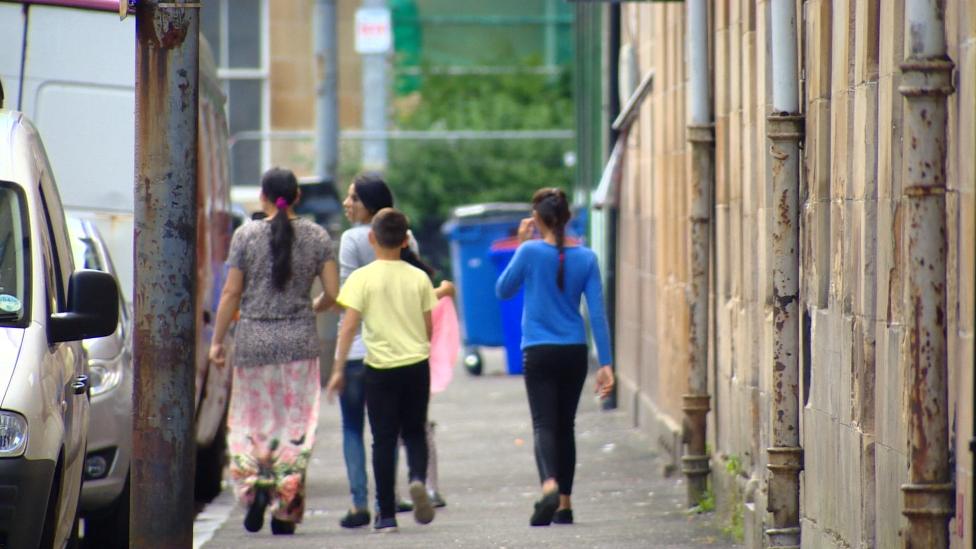
One volunteer worker said Govanhill reminded her of growing up in the 1960s where poverty was rife
In the Govanhill area of Glasgow, poverty is high and worker exploitation is commonplace. A BBC Scotland investigation looked at the extent of the area's problems and found people stealing from charity clothing containers and hunting in food waste bins.

The company looking after clothing bins in the Govanhill area said thefts had become so commonplace it was forced to change the specifications on the containers.
Peter Page of Nathans Waste Savers said both thefts and vandalism costs his firm £400,000 a year.
He explained: "We see local people stealing for their own benefit and a criminal aspect to it too.
"Someone actually dropped a child inside a clothing bin to pass stuff out. When the police came to chase the others away the child was left inside."
Slovakian Ivana Zigova came to Scotland six years ago. The 22-year-old has three jobs and earns about £4-an-hour cleaning in a local shop seven days a week - but says she is content.
"I love it here and I am happy with my work," she said. "I have a beautiful son and a very good husband."
Ivana insisted she did not want benefits and she was keen to work and to pay her way.
Figures obtained by the BBC show that of a study of 310 local Roma people, most were working but that more than a third were receiving less than the minimum wage.
Govanhill has one of the largest concentrations of Roma people in the UK.
Local organisation, Community Renewal, received funding from the People's Health Trust to do the study which involved volunteers from Slovakia and Romania holding conversations in their native languages.
Rubbish on the streets
One of the volunteers, Marek Balog is originally from Slovakia.
He said: "People are coming to Scotland to work, not live off benefits.
"They are willing to work for less than the minimum wage. About 30-40% work for less than the minimum wage. Some have to do it to survive."
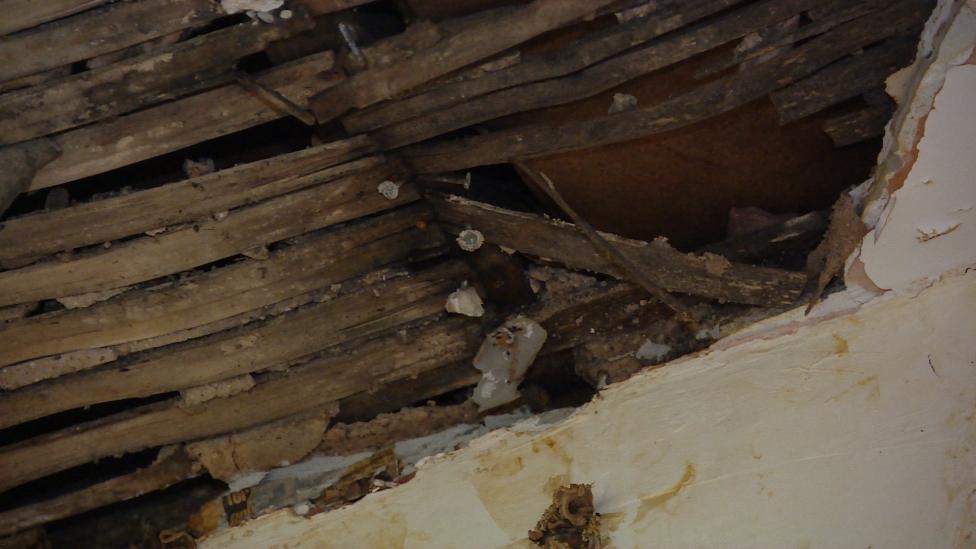
The conditions of some properties in the area have been condemned as appalling
Calina Toqer, from Romania, is also a volunteer on the project. She said some women were so poor they raked through the charity clothes bins.
The study also found that local Roma were fed-up with the rubbish on the streets and in the closes.
New figures show that since January the council has collected 900 tonnes of waste and recyclable material from domestic and commercial premises in the area.
In addition, they've collected 485 tonnes of illegally fly-tipped material from pavements and lanes.
There are 42 different languages spoken in Govanhill, but a glance at social media would suggest that all the migrants in the area are Roma.
They are often blamed for what goes wrong in the community.
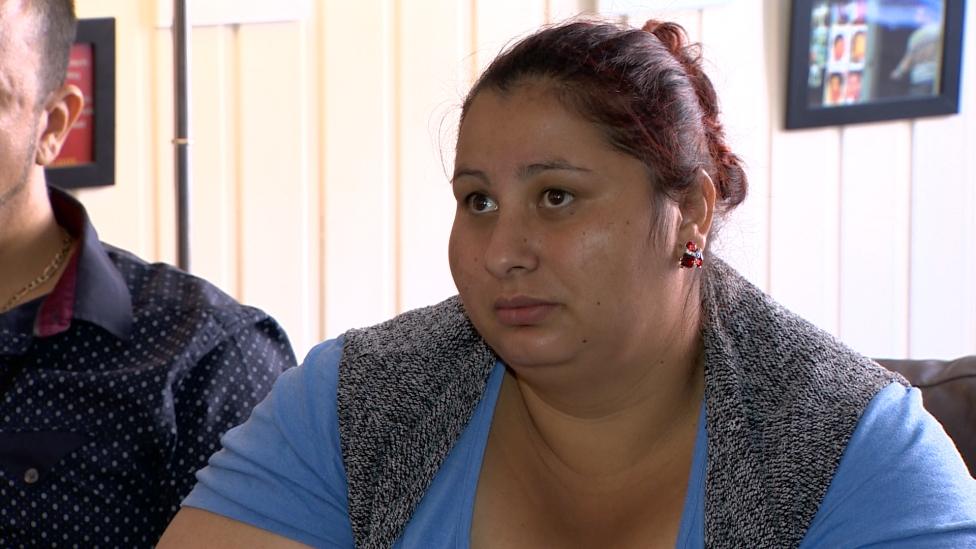
Calina Toqer said some women were so poor they raked through the charity clothes bins
However, the local police commander tells a different story.
Ch Insp Graham McInarlin, the area commander, said Govanhill did not merit its reputation.
He added: "There are a number of myths in the area.
"If we are to believe everything we read then the Roma are responsible for all crime in the area. In actual fact we know that is not the case. We do know that a number of Eastern Europeans in the area are very reluctant to report crime."
While there is light in the sky, the streets are full of bustle. Shops sell huge watermelons, bowls of oranges and apples.
So why is the area so poor?
There are children playing on scooters and bikes, men congregating on street corners, bin lorries and council collection trucks picking up old sofas, mattresses and broken drawers left on pavements and rubbish blows around in the breeze.
Parts of Govanhill are ranked among the most deprived in the country, according to the Scottish Index of Multiple Deprivation.
Local agencies highlight overcrowding, poor housing and rogue landlords as the key problem.
Margo Uprichard of The Space - a community project of the Daughters of Charity of St Vincent de Paul which works with Roma families in Govanhill - said the poverty in the area is quite extraordinary.
"What we saw when we came here was a community that reminded me of growing up in Glasgow in the 1960s," she said.
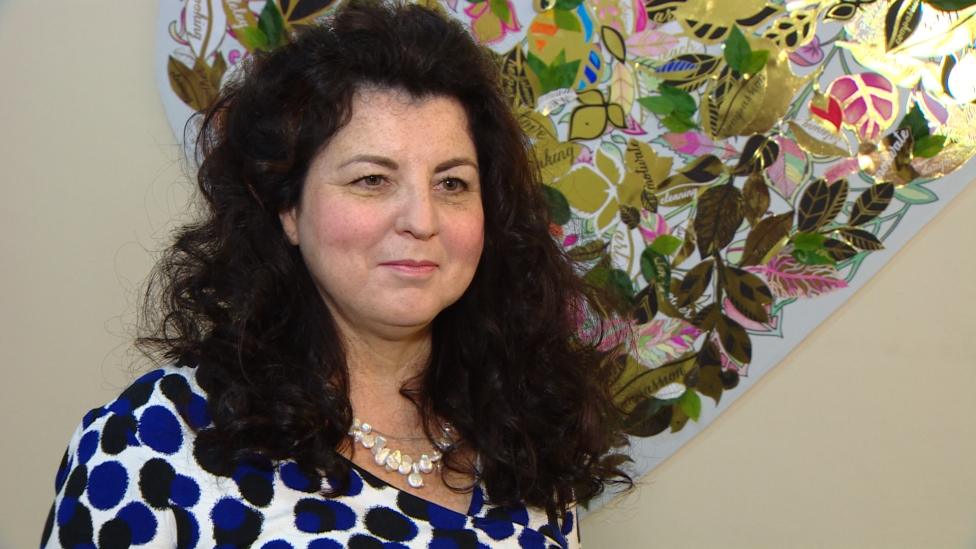
Margo Uprichard: "What we saw when we came here was a community that reminded me of growing up in Glasgow in the 1960s."
"We had workless men standing on street corners, large families and flats where there are infestations we have not seen for generations. Bed bugs, cockroaches and rats in flats.
"But on top of that you also have a people - many of whom - who have had no education and adults who have no capacity to read or write and don't know how to sign their name so they live in a communication vacuum."
And support agencies say the problems might have been exacerbated as there was a rise in migrants in the run up to the EU referendum in June.
Margo said: "We have seen an influx of people.
"We think they see it perhaps as their last chance of coming here."
Jim Monaghan agreed that there had been a "noticeable increase".
Mites, bed bugs and fleas
He is head of the Govanhill Baths Community Trust, a group created to raise enough money to re-open the Victorian swimming baths in the area closed by the council 15 years ago.
Jim said: "I think a lot of Romanians panicked that it was going to be the last chance to get in. Certainly a few hundred arrived in the lead up to the European vote.
"Poverty is the main problem in the area and has been for a long time. The problems came here before the Roma. Sometimes it's exacerbated by the amount of people and lack of housing but that's not about who the people are.
"There's a lot of one-bedroom flats. They're easy to get without references and so people gravitate here. People that already have problems gravitate here. There's far too many people living here. Years ago it was 8,500. Now it's 14,000."
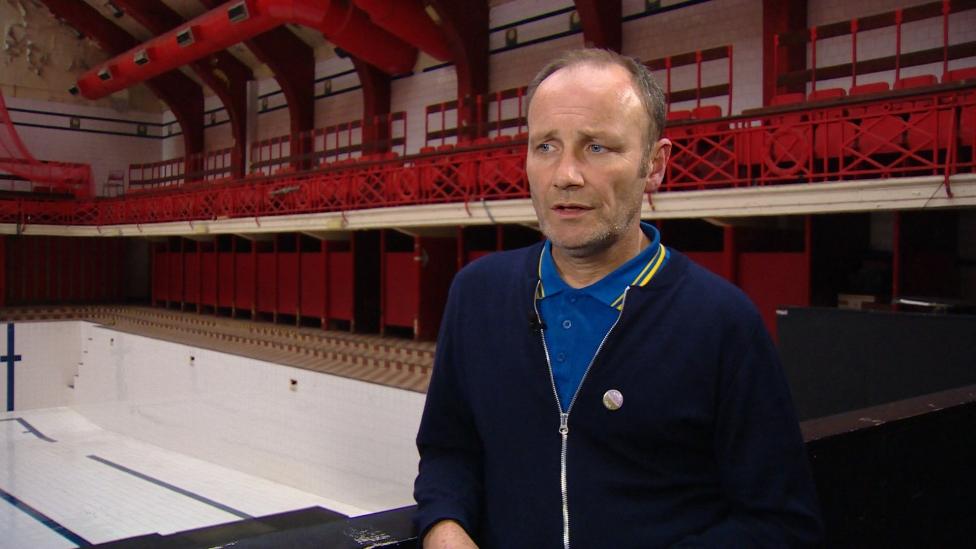
Jim Monaghan: "Poverty is the main problem in the area and has been for a long time."
With poverty comes other problems.
Figures obtained by the BBC under the Freedom of Information Act show that in the past four years there have been:
1,428 incidences of mites such as bed bugs and fleas,
1,864 incidences of cockroaches. Although the figures have dropped slightly.
Rachel Moon, of Govanhill Law Centre, said: "Govanhill has the highest concentration of cockroaches in Scotland. Quite often they just travel up and down the flats and it is really difficult to eradicate them. It is made so much worse by fly-tipping by private landlords.
"Rather than buying new mattresses they just take them from the street and it goes round in a circle. We have had clients with pock marks all over their arms and their children have pock marks all over their arms and they are sitting scratching because of all the lice and bed bugs.
"Often people don't want to have anything to do with public authority. They don't want to give evidence or take a case. They just want somewhere to live. Many clients are getting paid less than the minimum wage but they say they are happy to have a job."
But the area is also cause for hope.
'Amazingly vibrant place'
Beatbox musician Bigg Taj works with young people in the area.
He said: "I know people who have criticised Govanhill and I think it's people who have just heard the stories.
"They've actually come into the area, or they're kind of scared when they see a group of kids standing at the corner. Because I've worked here, walking down the street is fine, no one really gives you hassle.
"The group of young people I work with, they just want to work, they want to make music, they want to expressive themselves.
"Some of them want to be famous, they want to perform, that's what I've seen. They want to make something of themselves, they're not here to leach, they're not here to rob, they're not here to harm anyone, they just want to have a good life."
And Jim insists that despite its problems, Govanhill remains an "amazingly vibrant place".
He said: "All the bad things people will say are the bad things that have positive effects as well. Being so busy, there's always things going on. The low rents also bring in artists and students so there's lots of things happening in Govanhill."
- Published24 August 2016
